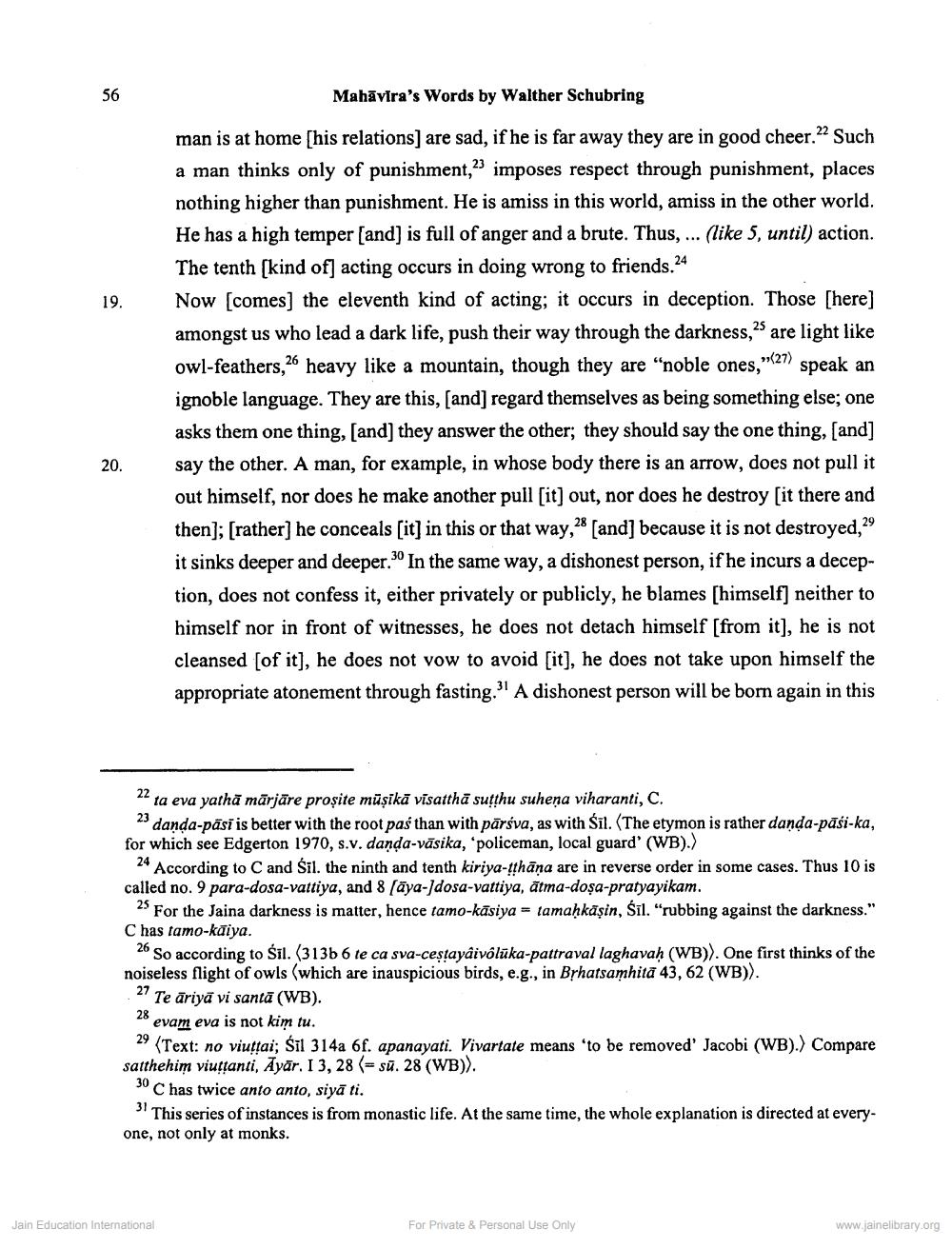________________
Mahāvīra's Words by Walther Schubring
19.
man is at home [his relations) are sad, if he is far away they are in good cheer.22 Such a man thinks only of punishment,23 imposes respect through punishment, places nothing higher than punishment. He is amiss in this world, amiss in the other world. He has a high temper (and) is full of anger and a brute. Thus, ... (like 5, until) action. The tenth [kind of] acting occurs in doing wrong to friends.24 Now [comes the eleventh kind of acting; it occurs in deception. Those [here) amongst us who lead a dark life, push their way through the darkness,as are light like owl-feathers,26 heavy like a mountain, though they are “noble ones,”(27) speak an ignoble language. They are this, (and) regard themselves as being something else; one asks them one thing, (and) they answer the other; they should say the one thing, [and] say the other. A man, for example, in whose body there is an arrow, does not pull it out himself, nor does he make another pull [it] out, nor does he destroy [it there and then]; (rather) he conceals [it] in this or that way,28 [and] because it is not destroyed, 29 it sinks deeper and deeper. In the same way, a dishonest person, if he incurs a deception, does not confess it, either privately or publicly, he blames [himself] neither to himself nor in front of witnesses, he does not detach himself (from it], he is not cleansed (of it], he does not vow to avoid [it], he does not take upon himself the appropriate atonement through fasting." A dishonest person will be born again in this
22 ta eva yathā mārjāre proșite mūşikā visatthā sutthu suheņa viharanti, C. 23 danda-pāsi is better with the root pas than with pārsva, as with sil. (The etymon is rather danda-pāśi-ka, for which see Edgerton 1970, s.v. danda-vāsika, 'policeman, local guard' (WB).)
24 According to C and Śil the ninth and tenth kiriya-tthāna are in reverse order in some cases. Thus 10 is called no. 9 para-dosa-vattiya, and 8 (āya-]dosa-vattiya, ātma-dosa-pratyayikam.
2 For the Jaina darkness is matter, hence tamo-kāsiya = tamaḥkāşin, Śīl. "rubbing against the darkness." C has tamo-kaiya.
26 So according to śil. (313b 6 te ca sva-cestaydivôlūka-pattraval laghavah (WB)). One first thinks of the noiseless flight of owls (which are inauspicious birds, e.g., in Brhatsamhita 43, 62 (WB)).
27 Te āriyā vi santā (WB). 28 evam eva is not kim tu.
- (Text: no viuttai; Sil 314a 6f. apanayati. Vivartate means 'to be removed' Jacobi (WB).) Compare satthehim viuftanti, Ayār. I 3,28 (= sū. 28 (WB)).
30 C has twice anto anto, siya ti. 3This series of instances is from monastic life. At the same time, the whole explanation is directed at everyone, not only at monks.
Jain Education International
For Private & Personal Use Only
www.jainelibrary.org




